Forty-five years ago, on March 11th, 1971, the Allman Brothers Band took the stage at Bill Graham’s vaunted Fillmore East Theater in New York for the first of a series of shows that are among the most celebrated in rock history. The Allmans weren’t even supposed to be the headliners. The posters Graham had printed up read: “Johnny Winter and Elvin Bishop Group. Extra Added Attraction: Allman Brothers.” By the end of the first night, the order had been forcibly flipped on its head.
During six sets of music spread across three evenings, the Allman Brothers Band — undeterred by bomb threats and a disastrous experiment with a patchwork horn section — pushed their songs to their very limits and redefined what it meant to jam onstage. The nearly 23-minute version of “Whipping Post” that closed the final night on March 13th set a high water mark in the then-fledgling tradition of Southern rock.
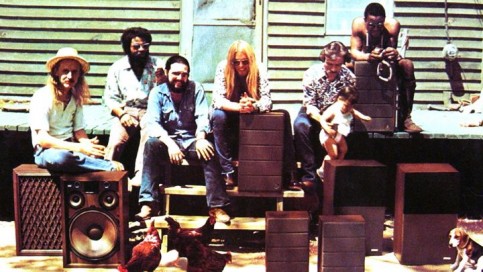
Three months later, on June 27th, the Brothers were back at the Fillmore East once again but under completely different circumstances. The venue was closing its doors forever and perhaps remembering the magic of their last run on his stage, Graham had handpicked the Allman Brothers Band to give his beloved concert hall a final, proper sendoff. They played until dawn, and when the show was over, a great church of rock, soul, jazz and blues music went along with it. Three months after that, Duane Allman — half of the ’71 group’s iconic guitar tandem — died in a Georgia motorcycle accident.
Rolling Stone recently caught up with some of the people onstage at that legendary run to discuss how those shows came together, and why they’ve endured in the minds and hearts of so many rock fans for nearly five decades.
Gregg Allman, Allman Brothers Band singer/keyboardist: Bill Graham was the most assertive person I’ve ever met. He was a straight shooter, a no-bullshit kind of guy. You always knew where you stood with Bill, man. He pulled no punches, but as tough as he was, he was always very fair.
Butch Trucks, Allman Brothers Band drummer: You just didn’t want to get in his way. Bill Graham did not tolerate people doing a half-assed job, and it’s the reason that playing the Fillmore and being in the audience at the Fillmore was so great. He ran it like clockwork, and he made sure that everybody in every seat could see and hear correctly.
Dickey Betts, Allman Brothers Band guitarist: He was a great guy. You know, either you hated Bill or you loved him, and I was one of the latter. He was one of the cornerstones of getting our band going.
Elvin Bishop, Elvin Bishop Band singer/guitarist: He ran a good organization both on the West Coast and the East Coast. He was kind of revolutionary because, before he came along, concerts were all one kind of music. They would never mix things up, and Bill Graham would have Rahsaan Roland Kirk, Albert King and the Jefferson Airplane all on one show.
Trucks: When I met Bill Graham for the first time, it was when I showed up for that closing night and walked across the stage. [He] saw me and came running. Up until that time I had never met him. He was always just this voice you heard on the other side of the room chewing somebody’s ass out who screwed up the night before. Anyway, he came running across the stage and grabbed me by the neck, and he was a large, strong man and he said, “I can’t thank you enough for last night.” And he went on and on and on, but in a nutshell he said, “It makes all the years of bullshit that I’ve had to put up with worthwhile.”
Allman: The Fillmore was originally an old Yiddish theatre built back in the Twenties, and it had a great vibe to it, man. The acoustics were nearly perfect in there. It had nice sight lines for the fans, and I think it held about 2,000 people or so, which was just right. The Fillmore East became a regular stop for us. It was like we had almost become the house band or something.
Betts: It was a great-sounding room. It was fun to play. Then you had a guy like Bill Graham that made sure that the PA system was set up correctly. It wasn’t too loud, it wasn’t too soft, and everyone in the room could hear and see.
Trucks: The audience was great and the sound was great. Every time you went in there it just sounded so goddamn good, and the audiences were just so in tune with what’s going on.
Allman: Bill wouldn’t pay you as much as some other promoters, but Bill would take a chance on people, and if you were good enough, he’d invite you back time and again, so we never worried about what he paid us.
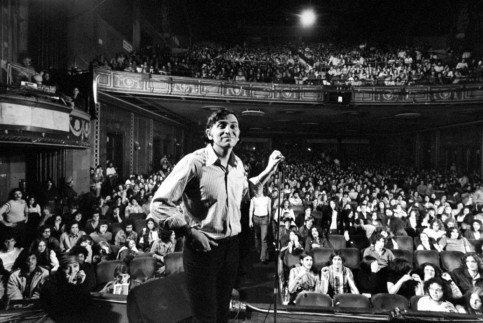
Betts: [He] presented the show in a very sophisticated way, in a way that many people weren’t used to seeing a rock & roll show done. He took a lot of cues from Broadway, I guess, like rolling drum sets on risers and rollers and setting them up on the sides. He could change bands very quickly. He had his light show, and it was very state-of-the-art back then, and he would get the old urban and Delta-blues players and educate the audience to what they meant to rock & roll.
Allman: My brother had always believed a live album was what the Brothers needed to do, and the record company finally agreed with him. The Fillmore was just the logical choice. I don’t think we even discussed another venue.
Trucks: That was one of the first places that the audience really got it. You know why we were able to record At Fillmore East? We actually weren’t the headline that weekend. You go back and look; we were the special guests for Johnny Winter. But after we played our first set on Thursday night, half the audience got up and walked out. Steve Paul, who was Johnny Winter’s manager, said, “Well, I guess Johnny is gonna be opening for the Allman Brothers from now on because we can’t have that happen again.” If that hadn’t happened, we absolutely wouldn’t have had all that time to do all the stretching out that led to At Fillmore East. We only had 90 minutes and had some songs that lasted longer than that!
Betts: It became obvious that we were a great band live. We could really play and the record people came up with the idea that, “Man, these guys need to be caught in the act.” We had a great situation. You know, we had [producer] Tom Dowd and Johnny Sandlin that came in and [recorded] those shows and they did a great job of it of course.
Trucks: We learned very early on that playing music is a very selfish thing. We’re up there playing for ourselves first and foremost. If I’m not getting myself off, how can I expect anyone else to get off on it? I start with myself then move out to the guys in the band, and then we start communicating. We kick it into overdrive and go into places that we can’t go by ourselves.
Allman: We just played and played, one gig after another. You got to remember that we spent 300 days on the road in 1970. I mean, we were never home. All we did was play, man.
Trucks: If it wasn’t for Tom Dowd and his genius at knowing acoustics and setting up microphones … There were certain things that he did to get the sound that you just can’t miss on At Fillmore East that every engineer out there would scream and holler is completely heretical. For one thing, Tom Dowd always told us that the most important thing about making a live album is that the most important microphones on that stage are pointed at the audience. He wanted all the sound on the record to feel like what it was like if you were at the Fillmore East, so he opened all of the vocal mics onstage and left them open for the whole show. Not once did he shut anything off. He knew that we could play well enough and that as long as we were playing our best, [the album] was not going to have to be remixed or repaired or anything else. You get all that ambience coming at you, and you don’t have to add a whole lot of outboard equipment or reverb or this, that and the other.
Allman: Tom almost missed recording the album. He’d been on vacation in Europe, and he only flew back to New York because the weather had been shitty in France or wherever. Tom didn’t even know we were recording that night, and when he found out, he barely made it into the truck. Thank God he did, or who knows what might have happened.
Betts: He was a great guy to work with and he was so subtle with his psychology. It took a while for me to figure out how good he was. I thought he didn’t do anything! He would be there without seeming like he was intruding. There was one thing that I finally figured out that he was doing. If I was trying to do a guitar solo, he would say, “You know, that was good, but I really like what you were doing back when we first started tonight.” And I’d say, “What’s that?” And he would sing to it and say, “Well you started out with this.” Then I finally realized that I had never done that [laughs]. It was his idea, but he didn’t want to seem like he was telling me what to play. I loved him for that.
Betts: There was kind of a running joke in the music business. Nobody said it in public in an interview or anything, but people would say, “The only thing live on such-and-such record was the audience.” [Laughs.] And I’m not saying anything bad about any of the other bands that we worked with and stuff, but a lot of times they would go back into the studio and re-do things; re-do vocals and stuff. The Fillmore East album is absolutely live. We didn’t go back and re-record one guitar solo; we didn’t add anything to it. Now there is some editing because we had some horn players and some harp solos that ran about three times longer than they should have been.
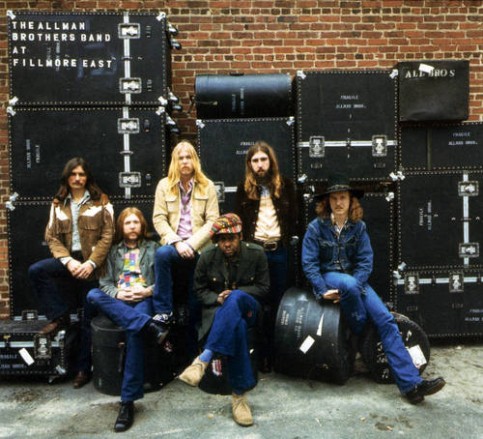
Trucks: We did some vocal overdubs, but everything else is just what we played.
Allman: The mood was good. It was always good, man, so the only change was we left the horn players out on the second night, except for Juicy Carter, and he only played on a few songs.
Trucks: There were three guys who used to play with Jaimoe out of Mississippi: Juicy, Fat and Tick. Juicy was the baritone player, and he used to play with us a lot — for years and years. Fat played the alto, and of the three of them, he was probably the only one that could really play. And Tick played tenor. You put all three of them together with us playing at the level we were playing, and they just weren’t there. After the opening night when we finished, Tom said, “Nix the horns! No way! That sucked! No fucking way!” Duane looked at him like, “Huh? I thought this was our band.” Luckily Duane trusted Tom’s judgment enough to say, “OK.” Duane was just of the mind that you gotta include the whole world in what we’re doing. He was constantly looking for ways to expand what we were doing.
Allman: My brother liked having them sit in from time to time, so to us, it was no big deal.
Betts: Duane was a very, very wise man for 22, 23 years old. It was really easy to talk sense with him about what we were trying to do. Let’s say we were riding from Georgia down to Florida where our folks lived and stuff, and we’d be drinking a little bit and having these long conversations about things like the Zen aspect of it all. Finding that innocence of mind, or what athletes call “getting in the zone.” You just get free and let things happen rather than make things happen. We used to laugh about so many bands who busted up because the guitar players would get so jealous and try to outdo each other all the time. We had an understanding that that was the worst thing you could do. It’s not a contact sport. It’s music.
Bishop: I thought they were great. I liked how they just went for it. I kind of agreed with their concept of giving it enough structure so that the bottom never fell out, but enough freedom that you could jam good.
Allman: My brother, he was the bandleader on stage. He’d count it off to start a song, and we would end it when he raised his hand, but in between, the band just let itself go wherever the music would take us.
Trucks: For my entire career, from the moment Duane Allman reached inside me, flicked the switch and turned me on, to this day, I’ve always locked on whoever is playing lead, whether it was Duane, if it was Dickey, if it was Gregg or if it was Barry Oakley. Quite often, I will see something they’re doing, even if I can’t hear it. I’m so comfortable in just feeling Jaimoe that I don’t have to listen to ’em. He’s just there. So if someone plays a lick or goes somewhere, I’m right on their ass, and it’s my job to stay on their ass and push them to higher places. I think it’s how I got the name “The Freight Train.”
Betts: It would switch from one guy to the other as the song evolved. We didn’t have anybody we took cues from. We just followed each other. [Barry] Oakley was great if a song was starting to lag. He would start really pumping on the bass to pull us into another direction. At the same time, I would do that too, start a riff or something that would kind of pick it up and make it sound good in a certain situation. Duane did the same thing.
Allman: My brother made up the set list, and it didn’t change very much from night to night. He liked it that way. We’d swap out a song or two, but we pretty much kept the same songs. The thing was, we’d never play them the same way twice.
Trucks: I seem to remember us going out there to the recording truck and listening to the set we just played and then we’d work out what we’d do next.
Betts: We just played whatever came up. Somebody would say, “Let’s play ‘One Way Out’ or something.” Well, except for “Whipping Post,” which we usually saved for the end of the show because it was such a slammer. “In Memory of Elizabeth Reed,” we’d put that near the end of the show.
Trucks: In those days, when we climbed into those songs, that’s all there was. It’s never been like that since. I mean, I’ve been able to get into the moment for brief times many, many times since then, but not for those long extended jams like on “Whipping Post,” for instance, where once the song started, you climbed in and there was no tomorrow, no yesterday; you were just totally in the moment from the time it started to the time it ended. On every song on that album, that’s what was happening. We were just at the peak of reaching the point where we knew each other well enough, we knew the material well enough to where we didn’t have to think about it and could let it all flow so naturally. We knew what each other was going to do — yet we were constantly wide open to letting it go and taking a dive and seeing what would happen.
Allman: [“Whipping Post”] was intense, man! Like I said, that whole set was intense.
Trucks: When you listen to Dickey’s solo on “Whipping Post,” he just lets everything go. We’re just doodling around, letting him go, and then all of a sudden, he starts playing this melody [sings], and you can hear Barry and Gregg and Duane all feeling around for where this chord progression is because we’d never done this before. By about the second or third progression through, Barry and Duane had locked in to what the chord progression was and then Dickey really laid into it and it just fucking took off. Then when we came roaring back in with the “Whipping Post” theme again, the place just exploded. We had just paid a visit to a place we’d never been before.
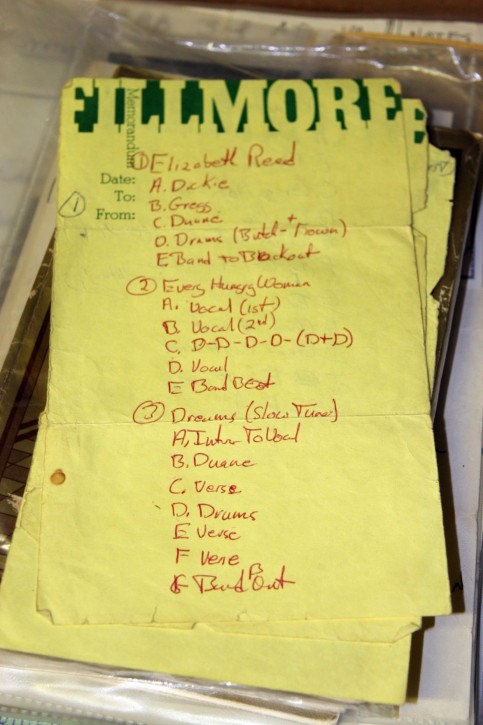
Allman: A bomb scare made that night’s second set start real, real late, and boy, did we get into a serious groove. We played some mind-blowing stuff in that set.
Bishop: I think there had been a bomb scare or something that happened. We were all gone for a couple of hours out of there, and when we came back, I guess they ran out of tunes so they got me to come up and jam on “Drunken Hearted Boy.”
Trucks: There were several [bomb scares] right around the same time. I do remember one at the Fillmore the weekend we were recording. Apparently they did find something. I never found out whether it was a bomb or not; they just said that they found something in one of the balconies. I have a feeling that there wasn’t a bomb, but rather than just saying, “We just wasted your time and emptied all of these buildings for nothing,” we’ll just tell you we found something. I just remember standing outside for a very long time thinking, “Hey, we should be inside playing music.” And, “All these people were in such a great state of mind and now we’re gonna have to go back to work to get them back into that frame of mind again, as well as ourselves.”
Trucks: The cover was supposed to obviously look like the outside of the Fillmore East where you supposedly load in and out, but that’s actually in an alleyway across the street from Capricorn Records on Broadway in Macon, Georgia. Our roadies just took our equipment truck out and line-loaded all our gear and packed it up and then somebody stenciled The Allman Brothers at Fillmore East on one of the cases.
Betts: Jim Marshall wanted us to be there at daylight in this alleyway to shoot these pictures and we thought, “Now what the fuck do we need to be out there at daylight for?” He wanted that natural yellow light, you know? He didn’t want to use flashbulbs or have a bright sun banging away at the situation. So anyway, we stayed up all night and went down there.
Trucks: We all sat down, and Jim Marshall had set himself up in the truck so he could get high enough to get the right perspective for the pictures. Then he started hollering at us about who to be where and do this now, do that now. I mean, he was not at all nice. He was a real son of a bitch who was lucky he didn’t get his ass kicked. At one point, some guy walked up to the side of the truck and right in the middle of taking all the pictures, Duane just jumps up and takes off to the side of the truck. Marshall goes ballistic, but we all saw what he was doing — he was picking up an eight ball from his connection. So he ran back, sat down real quick, Marshall is going, “Blah, blah!” and we all just busted up laughing. Luckily, he had enough sense in his tirade to take a picture, because that’s the picture, and it’s the only one of the whole goddamn day when we weren’t snarling at him like a bunch of pitbulls.
Allman: At Fillmore East went gold on October 25th, 1971. Four days later my brother was dead.
Trucks: [The record company] did not want to put it out. They fought with us and fought with us and fought with us, until they finally realized if they were gonna have anything at all, then that’s what they were gonna have. We were firmly convinced that we would never be a big-money band because Atlantic Records had pounded that into our heads. “You’re a Southern band, and you’re playing music, especially with a black guy in the group …” This is exactly what we heard from Jerry Wexler. “You gotta get Gregg out from behind that keyboard, stick a salami down his pants, and make him jump around onstage like Robert Plant, then maybe you got a chance.” Basically we just said, “Fuck you!” We had tried that kind of shit before and not only did we hate it, we hadn’t made a plug fucking nickel, much less become big rock stars. We decided that the music we were playing was much more important than becoming rock stars.
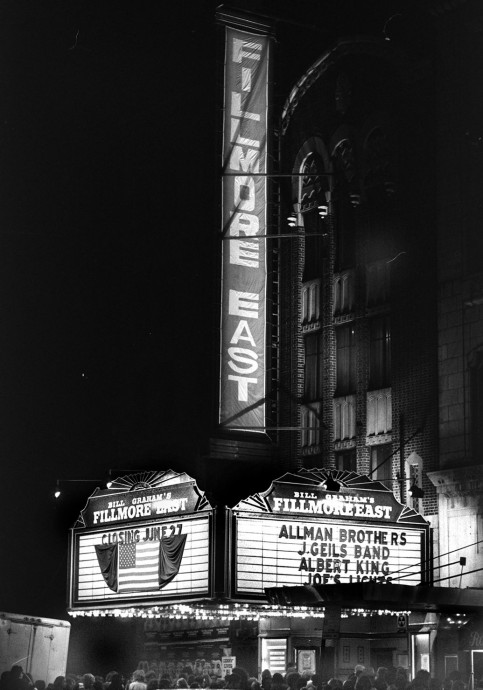
Allman: It meant so much to us that Bill Graham wanted the Brothers to close it all out at the Fillmore.
Betts: That was a special show. We played until daylight that morning. I remember it was dark in there, and when they opened the door, the sun about knocked us down. We didn’t realize we had played until seven, eight o’clock in the morning. Bill Graham just let us rattle and nobody said, “We gotta cut the time.” It was just a really free kind of thing. All of our performances at the Fillmore were special. For us, just because they had tape rolling in a truck outside, it really didn’t affect us that much. We didn’t play for the tape, we played for the people.
Trucks: We played for roughly seven straight hours with everything we had. We played a three-hour set and then came back out. The feeling from the audience, not necessarily the volume, but the feeling was just so overwhelming that I just started crying. Then we got into a jam, I think it was “Mountain Jam” that lasted for four straight hours. Nonstop. And when we finished, there was no applause whatsoever. The place was deathly quiet. Someone got up and opened the doors, the sun came pouring in, and you could see this whole audience with a big shit-eating grin on their face, nobody moving until finally they got up and started quietly leaving the place. I remember Duane walking in front of me, dragging his guitar while I was just sitting there completely burned, and he said, “Damn, it’s just like leaving church.” To this day, I meet people who say they were there, and I can tell if they were just by the look in their eye.
Allman: Bill Graham’s introduction when he said, “We’re going to finish it off with the best of them all — the Allman Brothers” — that is something I’ll always remember.
Trucks: I think Fillmore East was the last truly honest, from-the-soul record that we ever did. There’s absolutely nothing in there but us playing music. Even by Eat a Peach, a little bit of bullshit had started to sneak its way in, and by Brothers & Sisters, we were almost over the edge of more bullshit than music. We found ourselves in the position we swore we’d never be in of being rock stars playing bullshit rather than being musicians playing music.
Allman: No one did it better in a live setting than the Allman Brothers, and Fillmore East is still the proof, all these years later.
Betts: It was a great band, good music. It’s honest, I guess.
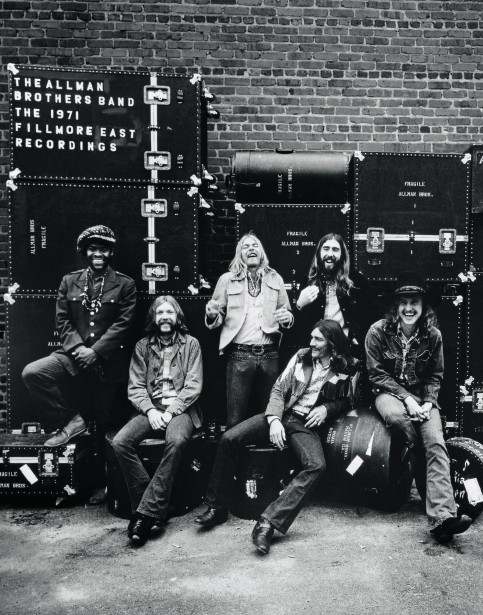
By Corbin Reiff

You must be logged in to post a comment Login